

United States Courts. European Court of Human Rights - Home page. European Court of Human Rights. Building of the European Court of Human Rights The European Court of Human Rights (ECtHR; French: Cour européenne des droits de l’homme) is a supra-national or international court established by the European Convention on Human Rights.
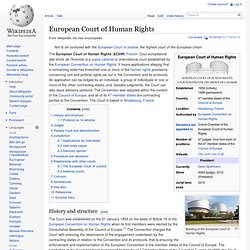
It hears applications alleging that a contracting state has breached one or more of the human rights provisions concerning civil and political rights set out in the Convention and its protocols. An application can be lodged by an individual, a group of individuals or one or more of the other contracting states, and, besides judgments, the Court can also issue advisory opinions. The Convention was adopted within the context of the Council of Europe, and all of its 47 member states are contracting parties to the Convention.
The Court is based in Strasbourg, France. History and structure[edit] Welcome to the United Nations: It's Your World. Contact. Nestlé’s Cocoa Plan in action, Côte d'Ivoire. Nestle's Slave Labor. Originally published in Forbes Magazine Companies, People, Ideas Deborah Orr 04.24.06 Anticorporate protesters went after Nestlé for its infant formula.
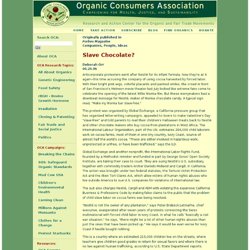
Now they're at it again--this time accusing the company of using cocoa harvested by forced labor. With their bright pink wigs, colorful placards and painted smiles, the crowd in front of San Francisco's Metreon movie theater last July looked like extreme fans come to celebrate the opening of the latest Willie Wonka film. But these merrymakers had a downbeat message for Nestlé, maker of Wonka chocolate candy. This protest was organized by Global Exchange, a California pressure group that has organized letter-writing campaigns, appealed to lovers to make Valentine's Day "slave-free" and told parents to mail their children's Halloween treats back to Nestlé and other chocolate makers who buy cocoa from plantations in West Africa. A chocolate trade group in Washington blames putting kids to work on farmer attitudes in West Africa. Nestlé.
Nestlé S.A.
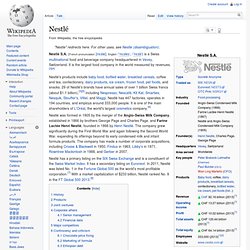
(French pronunciation: [nɛsle]; English /ˈnɛsleɪ/, /ˈnɛsli/) is a Swiss multinational food and beverage company headquartered in Vevey, Switzerland. It is the largest food company in the world measured by revenues.[3][4] Nestlé was formed in 1905 by the merger of the Anglo-Swiss Milk Company, established in 1866 by brothers George Page and Charles Page, and Farine Lactée Henri Nestlé, founded in 1866 by Henri Nestlé. The company grew significantly during the First World War and again following the Second World War, expanding its offerings beyond its early condensed milk and infant formula products. IHS Child Slave Labor News. By Brendan Nally October 2006 Today, almost a decade into the 21st century, most people regard slavery as an issue of the past.
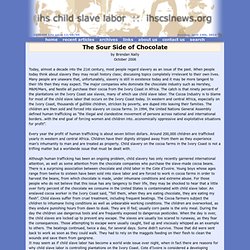
When people today think about slavery they may recall history class; discussing topics completely irrelevant to their own lives. Many people are unaware that, unfortunately, slavery is still in existence today and it may be more tangent to their life then they may expect. The major companies who dominate the chocolate industry such as Hershey, M&M/Mars, and Nestle all purchase their cocoa from the Ivory Coast in Africa. ILRF Update March 2009: Nestlé and Child Labor in the Cocoa Industry - Independent experts analyze Nestle's actions and words. Reports about the widespread use of child labor on cocoa farms in West Africa surfaced internationally in 2001.
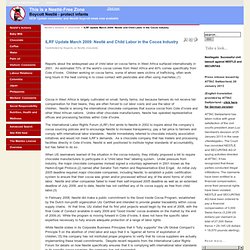
An estimated 70% of the world’s cocoa comes from West Africa and 40% comes specifically from Cote d’Ivoire. Children working on cocoa farms, some of whom were victims of trafficking, often work long hours in the heat coming in to close contact with pesticides and often using machetes.(1) Cocoa in West Africa is largely cultivated on small, family farms, but because farmers do not receive fair compensation for their beans, they are often forced to cut labor costs and use the labor of children. Nestlé is among the international chocolate companies that source cocoa from Cote d’Ivoire and other West African nations. Unlike other chocolate manufacturers, Nestle has operated representative offices and processing facilities within Cote d’Ivoire. Panorama - Tracing the bitter truth of chocolate and child labour.
This Easter, Britons will eat their way through 80m chocolate eggs without the slightest taste of how the essential ingredient in our favourite treat is harvested.
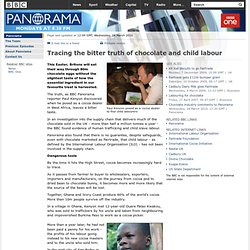
The truth, as BBC Panorama reporter Paul Kenyon discovered when he posed as a cocoa dealer in West Africa, leaves a bitter taste. In an investigation into the supply chain that delivers much of the chocolate sold in the UK - more than half a million tonnes a year - the BBC found evidence of human trafficking and child slave labour. Panorama also found that there is no guarantee, despite safeguards, even with chocolate marketed as Fairtrade, that child labour - as defined by the International Labour Organisation (ILO) - has not been involved in the supply chain.
Dangerous tools By the time it hits the High Street, cocoa becomes increasingly hard to trace. Together, Ghana and Ivory Coast produce 60% of the world's cocoa. Fairtrade Following remedial action by Kuapa Kokoo, the Fairtrade suspension was lifted in early January.